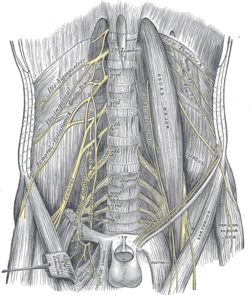Iliohypogastric nerve
| Iliohypogastric nerve | |
|---|---|
 Plan of lumbar plexus. (Iliohypogastric visible at upper left.) | |
 The lumbar plexus and its branches. (Iliohypogastric visible at upper left.) | |
| Details | |
| From | Lumbar plexus |
| Innervates | Sensory: Skin over the lateral gluteal region and above the pubis[1] Motor: internal oblique and transverse abdominal muscles |
| Identifiers | |
| Latin | nervus iliohypogastricus |
| TA98 | A14.2.07.003 |
| TA2 | 6496 |
| FMA | 16482 |
| Anatomical terms of neuroanatomy | |
The iliohypogastric nerve is a nerve that originates from the lumbar plexus that supplies sensation to skin over the lateral gluteal and hypogastric regions and motor to the internal oblique muscles and transverse abdominal muscles.
Structure
Origin
The iliohypogastric nerve originates from the superior branch of the anterior ramus of spinal nerve L1.[2] It also receives fibers from T12 via the subcostal nerve.[2] The branch below it is the ilioinguinal nerve.[2]
Course
It emerges from the upper lateral border of the psoas major.[3]: 1148 It then crosses in front of the quadratus lumborum muscle to an area superior to the iliac crest.[4] It runs behind the kidneys. Just superior to the iliac crest, it pierces the posterior part of the transversus abdominis muscle and continues anteriorly in the abdominal wall between the transversus abdominis and internal oblique muscles.[3]: 1148
It divides into a lateral cutaneous branch and an anterior cutaneous branch between the transversus abdominis muscle and the internal oblique muscle.
Branches
Lateral cutaneous branch
The lateral cutaneous branch ("iliac branch") pierces the internal oblique muscles and the external oblique muscles immediately above the iliac crest.[4] It is distributed to the skin of the gluteal region, behind the lateral cutaneous branch of the subcostal nerve; the size of this branch bears an inverse proportion to that of the lateral cutaneous branch of the subcostal nerve.
When harvesting bone from the anterior iliac crest (AICBG), the lateral cutaneous branch of the Iliohypogastric nerve (L1) is most likely to be injured.
- Area supplied by the lateral cutaneous branch can be seen in blue near the hip.
Anterior cutaneous branch
The anterior cutaneous branch ("hypogastric branch") continues onward between the abdominal internal oblique and transverse muscles.
It then pierces the internal oblique, becomes cutaneous by perforating the aponeurosis of the external oblique about 2.5 cm above the subcutaneous inguinal ring, and is distributed to the skin of the hypogastric region.
Communications
The iliohypogastric nerve communicates with the subcostal nerve and ilioinguinal nerves.[2]
Variation
The iliohypogastric nerve may be absent in up to 20% of people.[5] Its fibres are instead carried on other nerves, such as the ilioinguinal nerve.[5]
Function
The iliohypogastric nerve partially supplies the internal oblique muscles.[4] It also provides sensory innervation to the superior gluteal region and part of the suprapubic region.[4]
Clinical significance
The iliohypogastric nerve may be damaged at the points where it passes through the internal oblique muscle and the external oblique muscles.[6] It is most often damaged by medical error.[4] It may also be damaged by a nerve lesion.[4]
References
![]() This article incorporates text in the public domain from page 950 of the 20th edition of Gray's Anatomy (1918)
This article incorporates text in the public domain from page 950 of the 20th edition of Gray's Anatomy (1918)
- ^ med.mun.ca
- ^ a b c d Apaydin, Nihal (2015-01-01), Tubbs, R. Shane; Rizk, Elias; Shoja, Mohammadali M.; Loukas, Marios (eds.), "Chapter 47 - Variations of the Lumbar and Sacral Plexuses and Their Branches", Nerves and Nerve Injuries, San Diego: Academic Press, pp. 627–645, ISBN 978-0-12-410390-0, retrieved 2021-01-29
- ^ a b Susan Standring, ed. (2021). Gray's anatomy: the anatomical basis of clinical practice (42nd ed.). New York. ISBN 978-0-7020-7707-4. OCLC 1201341621.
{{cite book}}: CS1 maint: location missing publisher (link) - ^ a b c d e f H. Kim, Daniel; A. Murovic, Judith (2008-01-01), Kim, Daniel H.; Midha, Rajiv; Murovic, Judith A.; Spinner, Robert J. (eds.), "11 - Lower extremity nerve injuries", Kline and Hudson's Nerve Injuries (Second Edition), Edinburgh: W.B. Saunders, pp. 209–278, ISBN 978-0-7216-9537-2, retrieved 2021-01-29
- ^ a b Aasar, YH (1947). "Anatomical Anomalies". Fouad I University Press, Cairo.
- ^ Mirjalili, S. Ali (2015-01-01), Tubbs, R. Shane; Rizk, Elias; Shoja, Mohammadali M.; Loukas, Marios (eds.), "Chapter 45 - Anatomy of the Lumbar Plexus", Nerves and Nerve Injuries, San Diego: Academic Press, pp. 609–617, ISBN 978-0-12-410390-0, retrieved 2021-01-29
External links
- Iliohypogastric nerve at the Duke University Health System's Orthopedics program
- Atlas image: abdo_wall70 at the University of Michigan Health System - "Posterior Abdominal Wall, Dissection, Anterior View"
- Anatomy photo:35:05-0101 at the SUNY Downstate Medical Center - "Anterior Abdominal Wall: The Iliohypogastric and IlioInguinal Nerves"
- Anatomy photo:40:17-0101 at the SUNY Downstate Medical Center - "Posterior Abdominal Wall: Nerves of the Lumbar Plexus"
- Anatomy image:7055 at the SUNY Downstate Medical Center
- Anatomy image:7221 at the SUNY Downstate Medical Center
- Anatomy image:7257 at the SUNY Downstate Medical Center
- posteriorabdomen at The Anatomy Lesson by Wesley Norman (Georgetown University) (posteriorabdmus&nerves)

